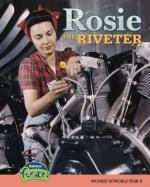|
This section contains 915 words (approx. 4 pages at 300 words per page) |

|
With some 16.3 million men in the military, employment opportunities for women expanded at unparalleled rates during World War II. Rosie the Riveter became the
 Poster depicting Rosie the Riveter, declaring "We Can Do It!" to World War II women.
Poster depicting Rosie the Riveter, declaring "We Can Do It!" to World War II women.
national symbol of the millions of women who took on new and challenging jobs created by the nation's expanded wartime economy. Songwriters Redd Evans and John Jacob Loeb first popularized the term in a 1942 song that heralded the contributions of a dedicated riveter named Rosie. Newspapers and magazines regularly published stories about strong, powerful women in overalls and hardhats performing "men's jobs" in behalf of the war effort. This image was reinforced early in 1943 when a recruitment poster, commissioned by the U.S. War Production Commission, featured a resolute female worker, with upraised muscular arm, that included the caption, "We Can Do It!" The May...
|
This section contains 915 words (approx. 4 pages at 300 words per page) |

|


